- Joined
- Aug 15, 2019
- Messages
- 7,493
- Reaction score
- 143
- Points
- 63
The Survivor
[FHM, June 2001. Words: Caroline Rees. Pictures: Anton Corbijn / Various.]
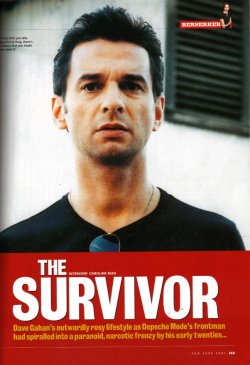
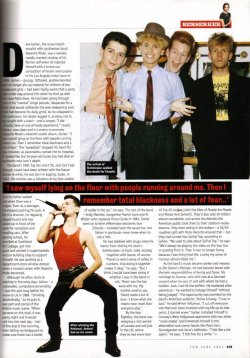
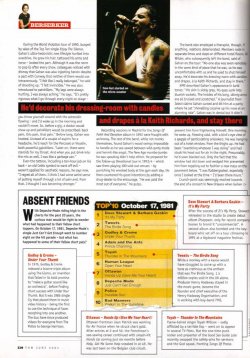
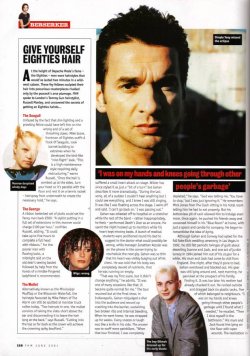
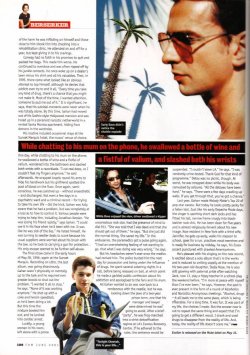
Dave Gahan, the once-impish vocalist with synthesiser band Depeche Mode, was a wasted, needle-marked shadow of his former self when he injected himself with a knock-out concoction of heroin and cocaine in his Los Angeles hotel room in 1996. Gahan – grungy, tattooed, goatee-bearded and no longer pin-up material for millions of pre-pubescent girls – had been hazily aware that a party was under way around him when he shot up with the near-fatal dose. He had been going through one of his “mental” binge periods, desperate for a high that would obliterate the ever-deepening lows that had become his daily grind. As he collapsed in the bathroom, his dealer legged it, anxious not to be caught with a stash – and a corpse. “I did actually have an out-of-body experience,” recalls Gahan, now clean and in London to promote Depeche Mode’s eleventh studio album, Exciter. “I saw myself lying on the floor with people running round me. Then I remember total blackness and a lot of fear.” The ‘speedball’ stopped his heart for two minutes; as paramedics rushed him to hospital, it looked like the 34-year-old Essex boy had died an authentic rock icon’s death.
The band’s 1981 Top Ten chart hit, Just Can’t Get Enough, could have been written with the future Gahan in mind. He was born in Epping, Essex, in 1962. His mother was a Salvation Army foot-soldier and his father walked out when Dave was a nipper. Even as a teenager, he enjoyed pushing his luck. A bit of a chancer, he regularly played truant and was called up in front of the beak for vandalism and stealing cars. After leaving school, he enrolled at Southend Art College, got into punk and worked in supermarkets and on building sites to support himself. He was working as a department-store window dresser when a musical career with Depeche Mode beckoned.
Although he often stuck to sobriety in the early days, Gahan – a vulnerable, compulsive personality – lost the plot long before his move to L.A. in 1989. [1] “Drinking alcoholically,” as he puts it, was part and parcel of the British music scene. “When we were on the road, it was every night and it would roll into the next day – hair of the dog in the morning, then telling my bodyguard to make sure there was a bottle of vodka in the car,” he says. The rest of the band – Andy Fletcher, songwriter Martin Gore and Al Wilder (who replaced Vince Clarke in 1981; Clarke went on to form the effeminate electronic duo Erasure) – knocked back the sauce too, but Gahan in particular never knew when to call a halt.
He had dabbled with drugs since his teens: from nicking his mum’s barbiturates, to hash, coke, ecstasy – together with booze, of course. “There’s a weird sense of safety in numbers, that doing it together makes it okay,” he says. “But I think I would have been doing it whether I was in the band or not. ‘More’ was the key word with me. My mother used to say, ‘David needs a lot of love.’ I know what she means now: more than everyone else.”
By the late Eighties, the band was enjoying a rich period of success and not just in the UK, where they’ve had more than 16 Top 20 singles (with the likes of People Are People and Master And Servant). They’d also sold 50 million albums worldwide, and across the Atlantic the American public took them to their stadium-rocker bosoms. They were raking in the dollars – a 50/50 royalties spilt with Mute Records had ensured that – but they had turned into Spinal Tap, according to Gahan. “We used to joke about Spinal Tap,” he says. “We’d always be playing the video on the tour bus or quoting from it. Then it was no longer funny because I was living that life. Losing my sense of humour almost killed me.”
As the band’s music became darker and meaner, so did Gahan’s lifestyle. He had become bored with the twin responsibilities of family and fame. His marriage to Joanne, who he’d met at a Damned concert when he was 17 and with whom he had a toddler, Jack, had hit the buffers. He hankered after adventure – he wanted to indulge himself “without being judged”. The opportunity was provided by the band’s American publicist, Teresa Conway. “I was in lust,” he said of her influence. “I cut off everyone who had ever been involved with my life up to that point. I started anew.” Gahan installed himself in Conway’s West Hollywood apartment with two other “room-mates” and immersed himself in the alternative rock scene: bands like Pearl Jam, Soundgarden and Jane’s Addiction. “I felt like a kid again,” he says. “I felt free for a while.”
During the World Violation tour of 1990, buoyed by sales of the Top Ten single Enjoy The Silence, Gahan’s ultra-hedonistic new lifestyle hurtled into overtime. He grew his hair, tattooed his arms and torso – looked the part. Although it was the norm to pop Es after every show, colleagues noticed with dismay that Gahan was also injecting heroin despite a pact with Conway that neither of them would use intravenously. “I felt like I really belonged,” he said of shooting up. “I felt invincible.” He was also introduced to painkillers. “My legs were always hurting. I was always aching,” he says, “It’s pretty rigorous what I go through every night on stage – you throw yourself around with the adrenalin flowing – and I’d wake up in the morning and couldn’t move. So, before a gig, a doctor would show up and painkillers would be prescribed: back pain, this pain, that pain.” Before long, Gahan was hooked. Instead of a couple of aspirin for a headache, he’d reach for the Percoset or Vicodin, both powerful painkillers. “Later on, there were steroids for my throat. And when you put drink into the mix as well, I was like a garbage can.” [2]
Even the tattoos, including a ten-hour job on his back – an old Celtic symbol to ward off evil – weren’t applied for aesthetic reasons, he says now. “I regret all of them. I think I had some weird sense of putting myself through a lot of pain and, from that, I thought I was becoming stronger.”
Recording sessions in Madrid for the Songs Of Faith And Devotion album in 1992 were fraught with acrimony. The rest of the band, while not monks themselves, found Gahan’s mood swings impossible to handle as he see-sawed between wild-party mode and hermit-like angst. The New Age mumbo-jumbo he was spouting didn’t help either. He prepared for the follow-up Devotional tour in 1993/4 – which saw them playing 100 sold-out venues – by punishing his wrecked body at the gym each day. He then countered his good intentions by adding a drug-dealer to the entourage. “He was paid the most out of everyone,” he quips.
The band also employed a therapist, though, if anything, relationships deteriorated. Members rode in separate limos and slept on different hotel floors. Al Wilder, who subsequently left the band, said of Gahan on the tour: “No-one else was even remotely in the same kind of place that he was, so he was uncomfortable with us and he used to shut himself away. He’d decorate his dressing-room with candles and drapes, ŕ la Keith Richards, and stay in there.”
NME described Gahan’s appearance in lurid tones: “His skin is sickly grey, his eyes sunk into bluish sockets. The insides of his long, skinny arms are all bruised and scratched.” [3] A journalist from Select claims Gahan cursed and bit him at a party where he say “shovelling cocaine up his nose at an alarming rate.” Gahan was in denial but it didn’t prevent him from frightening himself. One morning, he woke up, freezing cold, with a bird’s eye view of a gaggle of gesticulating onlookers. He was hanging out of a hotel window, from the thighs up. He had been “overdoing whatever I was doing” and had stuck his head out for air in the night. Presumably, he’d soon blacked out. Only the fact that the window had slid down and wedged him prevented him from toppling out to fashion a new mess on the pavement below. “I was flabbergasted, especially once I looked at the time – I’d been there hours.”
Crunch-point was seemingly reached towards the end of a concert in New Orleans when Gahan suffered a small heart attack on stage. Wilder has since styled it as “just a bit of a turn” but Gahan describes it more dramatically. “During the last song, all of a sudden I couldn’t hear anything but I could see everything, and I knew I was still singing. It was like I was floating across the stage. I went off and said, ‘I can’t go back on.’ I was passing out.”
[FHM, June 2001. Words: Caroline Rees. Pictures: Anton Corbijn / Various.]
Relentless chronicle of Dave's problem years, far enough from the events to be old news. Here Dave is just learning how to laugh at his former self, but the writer's tone seems one of admiration at his resilience combined with horrified fascination. It all seems to lick its lips at the nasty details a bit too much, and there comes a point where reading it just feels plain wrong.
" Not even a few days in a psychiatric ward and a criminal record – for trying to take his own life – did the trick. "





Dave Gahan, the once-impish vocalist with synthesiser band Depeche Mode, was a wasted, needle-marked shadow of his former self when he injected himself with a knock-out concoction of heroin and cocaine in his Los Angeles hotel room in 1996. Gahan – grungy, tattooed, goatee-bearded and no longer pin-up material for millions of pre-pubescent girls – had been hazily aware that a party was under way around him when he shot up with the near-fatal dose. He had been going through one of his “mental” binge periods, desperate for a high that would obliterate the ever-deepening lows that had become his daily grind. As he collapsed in the bathroom, his dealer legged it, anxious not to be caught with a stash – and a corpse. “I did actually have an out-of-body experience,” recalls Gahan, now clean and in London to promote Depeche Mode’s eleventh studio album, Exciter. “I saw myself lying on the floor with people running round me. Then I remember total blackness and a lot of fear.” The ‘speedball’ stopped his heart for two minutes; as paramedics rushed him to hospital, it looked like the 34-year-old Essex boy had died an authentic rock icon’s death.
The band’s 1981 Top Ten chart hit, Just Can’t Get Enough, could have been written with the future Gahan in mind. He was born in Epping, Essex, in 1962. His mother was a Salvation Army foot-soldier and his father walked out when Dave was a nipper. Even as a teenager, he enjoyed pushing his luck. A bit of a chancer, he regularly played truant and was called up in front of the beak for vandalism and stealing cars. After leaving school, he enrolled at Southend Art College, got into punk and worked in supermarkets and on building sites to support himself. He was working as a department-store window dresser when a musical career with Depeche Mode beckoned.
Although he often stuck to sobriety in the early days, Gahan – a vulnerable, compulsive personality – lost the plot long before his move to L.A. in 1989. [1] “Drinking alcoholically,” as he puts it, was part and parcel of the British music scene. “When we were on the road, it was every night and it would roll into the next day – hair of the dog in the morning, then telling my bodyguard to make sure there was a bottle of vodka in the car,” he says. The rest of the band – Andy Fletcher, songwriter Martin Gore and Al Wilder (who replaced Vince Clarke in 1981; Clarke went on to form the effeminate electronic duo Erasure) – knocked back the sauce too, but Gahan in particular never knew when to call a halt.
He had dabbled with drugs since his teens: from nicking his mum’s barbiturates, to hash, coke, ecstasy – together with booze, of course. “There’s a weird sense of safety in numbers, that doing it together makes it okay,” he says. “But I think I would have been doing it whether I was in the band or not. ‘More’ was the key word with me. My mother used to say, ‘David needs a lot of love.’ I know what she means now: more than everyone else.”
By the late Eighties, the band was enjoying a rich period of success and not just in the UK, where they’ve had more than 16 Top 20 singles (with the likes of People Are People and Master And Servant). They’d also sold 50 million albums worldwide, and across the Atlantic the American public took them to their stadium-rocker bosoms. They were raking in the dollars – a 50/50 royalties spilt with Mute Records had ensured that – but they had turned into Spinal Tap, according to Gahan. “We used to joke about Spinal Tap,” he says. “We’d always be playing the video on the tour bus or quoting from it. Then it was no longer funny because I was living that life. Losing my sense of humour almost killed me.”
As the band’s music became darker and meaner, so did Gahan’s lifestyle. He had become bored with the twin responsibilities of family and fame. His marriage to Joanne, who he’d met at a Damned concert when he was 17 and with whom he had a toddler, Jack, had hit the buffers. He hankered after adventure – he wanted to indulge himself “without being judged”. The opportunity was provided by the band’s American publicist, Teresa Conway. “I was in lust,” he said of her influence. “I cut off everyone who had ever been involved with my life up to that point. I started anew.” Gahan installed himself in Conway’s West Hollywood apartment with two other “room-mates” and immersed himself in the alternative rock scene: bands like Pearl Jam, Soundgarden and Jane’s Addiction. “I felt like a kid again,” he says. “I felt free for a while.”
During the World Violation tour of 1990, buoyed by sales of the Top Ten single Enjoy The Silence, Gahan’s ultra-hedonistic new lifestyle hurtled into overtime. He grew his hair, tattooed his arms and torso – looked the part. Although it was the norm to pop Es after every show, colleagues noticed with dismay that Gahan was also injecting heroin despite a pact with Conway that neither of them would use intravenously. “I felt like I really belonged,” he said of shooting up. “I felt invincible.” He was also introduced to painkillers. “My legs were always hurting. I was always aching,” he says, “It’s pretty rigorous what I go through every night on stage – you throw yourself around with the adrenalin flowing – and I’d wake up in the morning and couldn’t move. So, before a gig, a doctor would show up and painkillers would be prescribed: back pain, this pain, that pain.” Before long, Gahan was hooked. Instead of a couple of aspirin for a headache, he’d reach for the Percoset or Vicodin, both powerful painkillers. “Later on, there were steroids for my throat. And when you put drink into the mix as well, I was like a garbage can.” [2]
Even the tattoos, including a ten-hour job on his back – an old Celtic symbol to ward off evil – weren’t applied for aesthetic reasons, he says now. “I regret all of them. I think I had some weird sense of putting myself through a lot of pain and, from that, I thought I was becoming stronger.”
Recording sessions in Madrid for the Songs Of Faith And Devotion album in 1992 were fraught with acrimony. The rest of the band, while not monks themselves, found Gahan’s mood swings impossible to handle as he see-sawed between wild-party mode and hermit-like angst. The New Age mumbo-jumbo he was spouting didn’t help either. He prepared for the follow-up Devotional tour in 1993/4 – which saw them playing 100 sold-out venues – by punishing his wrecked body at the gym each day. He then countered his good intentions by adding a drug-dealer to the entourage. “He was paid the most out of everyone,” he quips.
The band also employed a therapist, though, if anything, relationships deteriorated. Members rode in separate limos and slept on different hotel floors. Al Wilder, who subsequently left the band, said of Gahan on the tour: “No-one else was even remotely in the same kind of place that he was, so he was uncomfortable with us and he used to shut himself away. He’d decorate his dressing-room with candles and drapes, ŕ la Keith Richards, and stay in there.”
NME described Gahan’s appearance in lurid tones: “His skin is sickly grey, his eyes sunk into bluish sockets. The insides of his long, skinny arms are all bruised and scratched.” [3] A journalist from Select claims Gahan cursed and bit him at a party where he say “shovelling cocaine up his nose at an alarming rate.” Gahan was in denial but it didn’t prevent him from frightening himself. One morning, he woke up, freezing cold, with a bird’s eye view of a gaggle of gesticulating onlookers. He was hanging out of a hotel window, from the thighs up. He had been “overdoing whatever I was doing” and had stuck his head out for air in the night. Presumably, he’d soon blacked out. Only the fact that the window had slid down and wedged him prevented him from toppling out to fashion a new mess on the pavement below. “I was flabbergasted, especially once I looked at the time – I’d been there hours.”
Crunch-point was seemingly reached towards the end of a concert in New Orleans when Gahan suffered a small heart attack on stage. Wilder has since styled it as “just a bit of a turn” but Gahan describes it more dramatically. “During the last song, all of a sudden I couldn’t hear anything but I could see everything, and I knew I was still singing. It was like I was floating across the stage. I went off and said, ‘I can’t go back on.’ I was passing out.”
[1] - Dave's move to L.A. was, I believe, nearer late 1990, early 1991. It certainly wasn't as early as 1989 as his first marriage was still on the rocks throughout the Violator tour of 1990.
[2] - Back in 1997 (NME, 18th January) the subject inspired a moment of black humour in Dave: "On noticing that his press officer's hand is damaged after a nasty kitchen incident involving boiling hot gravy, he ponders which painkillers she could use. "Anything you want to know about American prescription tranquilisers, man, ask me. I've done the lot." "
[3] - That's NME, 18th September 1993.Dave Gahan - Dead Man Talking (NME, 1997)
Dead Man Talking [NME, 18th January 1997. Words: Keith Cameron. Pictures: Stefan de Batselier.]dmremix.pro
Depeche Mode - Penance Extra (NME, 1993)
Penance Extra [NME, 18th September 1993. Words: Gavin Martin. Pictures: Stefan de Batselier / Anton Corbijn.]dmremix.pro
